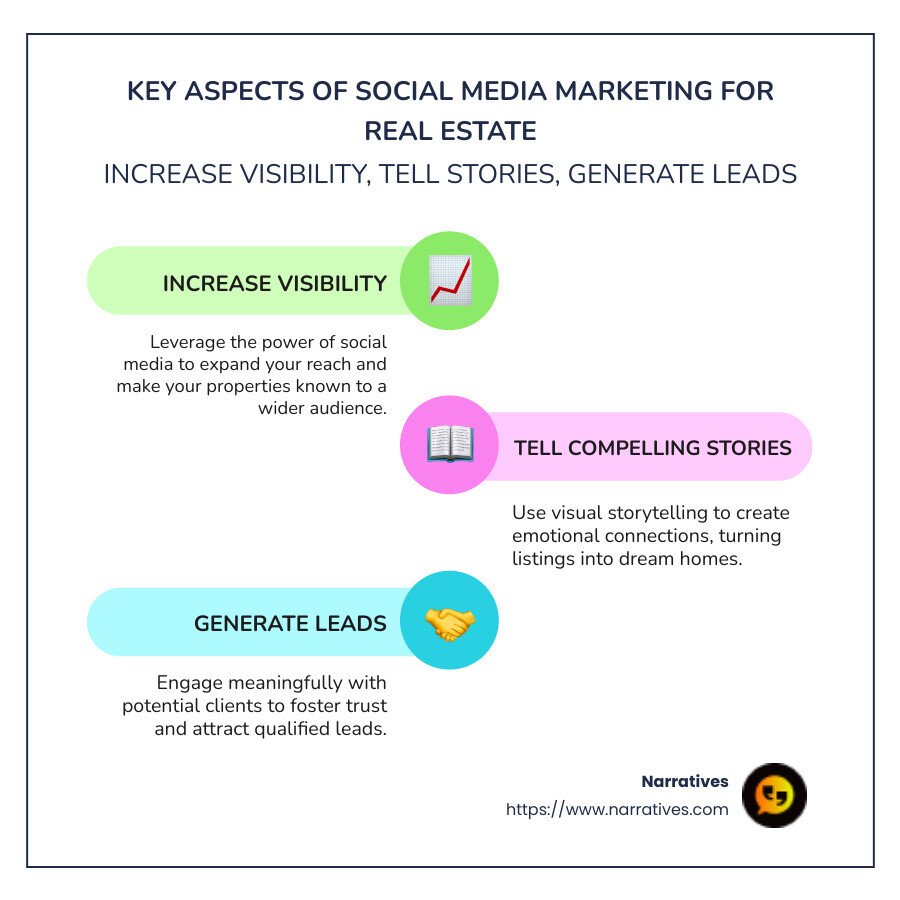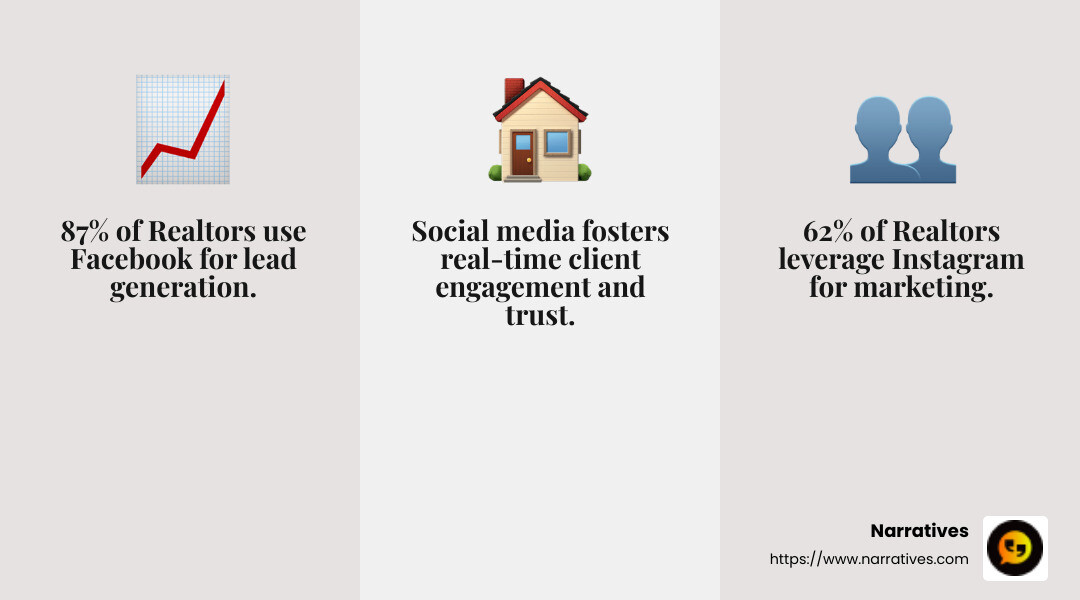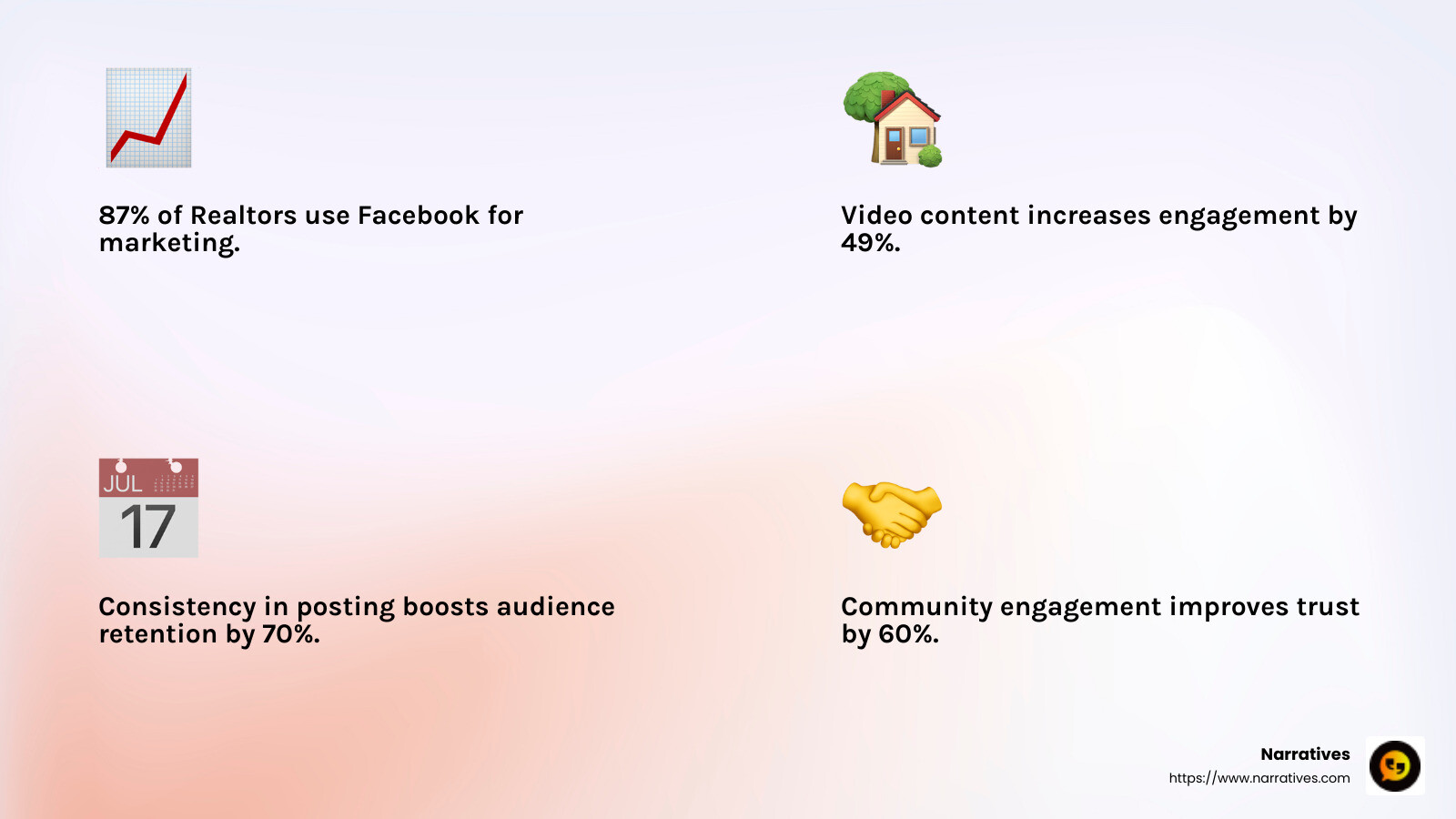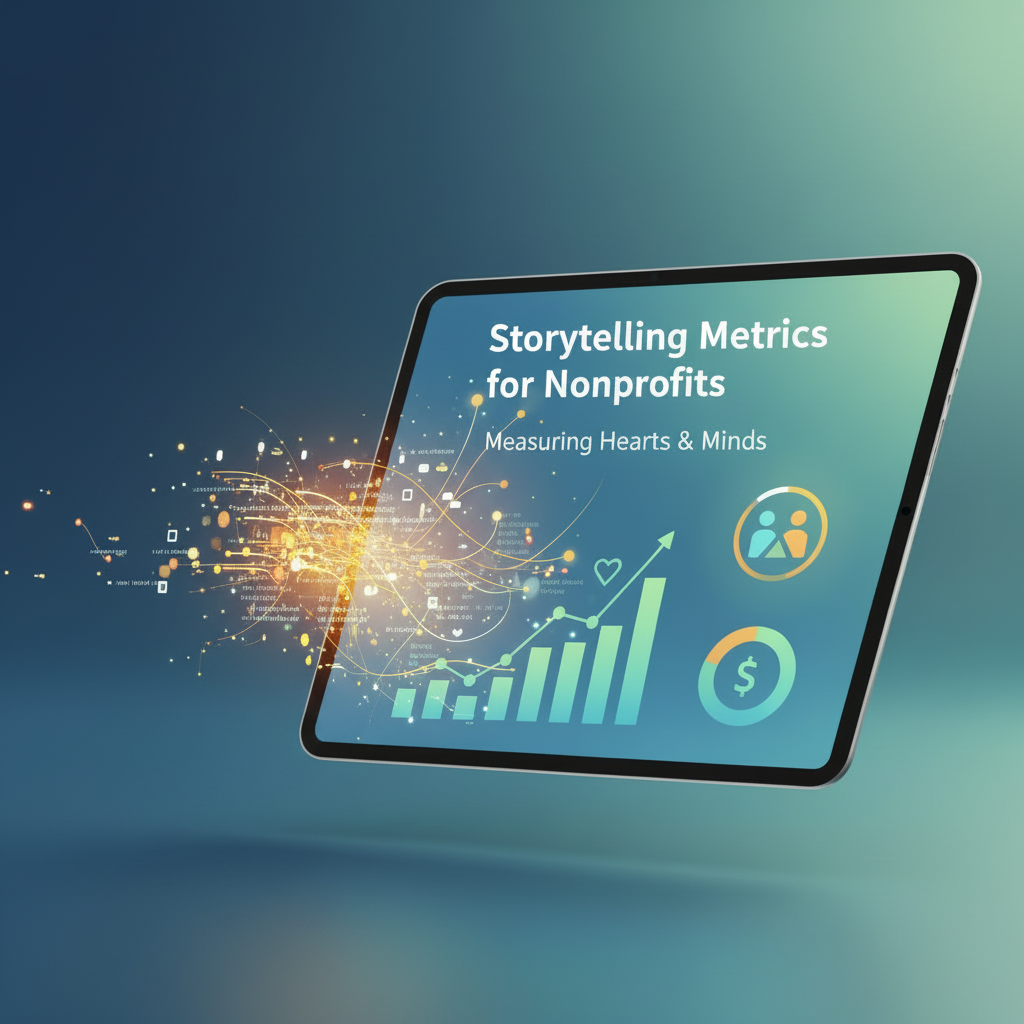Unlocking Doors: Social Media Strategies for Real Estate

Boldly stepping into the digital era, social media marketing for real estate companies is now a pivotal tool for growth and connection. When 4.88 billion social media profiles exist and the average user spends hours daily navigating these platforms, the opportunity to amplify your real estate presence is enormous. Real estate thrives in this visual space, enabling agents to:
- Increase visibility and generate qualified leads.
- Tell powerful visual stories of their properties.
- Engage meaningfully with potential clients.
The essence of social media isn’t just about posting pictures of houses; it’s about weaving a story that resonates. Social media platforms are not merely marketing channels but storytelling arenas. Here, real estate companies can craft narratives that evoke emotions and inspire actions — crucial for the human-touch industry they operate within. These stories turn listings into dream homes and connect agents with communities.
Imagine a busy agent's day, filled with negotiations, property showings, and client interactions. Sharing behind-the-scenes content or client success stories can transform a typical post into a story-driven journey of trust and transparency. “Facts tell, but stories sell.” This age-old marketing adage rings truer than ever in today’s digital landscape.
Real estate professionals who master social media blend strategic marketing with digital storytelling. They build relationships, establish credibility, and ultimately, open up the doors to new business opportunities.

Social media marketing for real estate companies terms to remember:
- social media advertising for real estate agents
- social media marketing for b2b companies
- social media management strategy
Why Social Media Marketing for Real Estate Companies Matters
In the busy world of real estate, social media marketing for real estate companies is not just an option; it's a necessity. Social media platforms offer a powerful way to generate leads, build your brand, and engage with clients like never before.
Lead Generation
Social media is a goldmine for generating new leads. With nearly 87% of Realtors using Facebook and 62% leveraging Instagram, these platforms have become essential for reaching potential buyers and sellers. Targeted advertising allows agents to tailor their messages to specific demographics, ensuring that their listings reach the right audience. Sophisticated targeting means you can connect with first-time buyers or high-net-worth individuals looking to expand their portfolios.
Brand Building
Building a strong online presence is crucial for any real estate company. Social media allows agents to showcase their expertise and establish credibility by sharing market updates, educational content, and success stories. Consistent and relevant content helps position agents as trusted advisors in the real estate industry. By sharing insights and engaging visuals, you can create a brand that stands out and resonates with your audience.
Client Engagement
Engagement is the heart of social media. Platforms like Instagram and Facebook provide opportunities for real-time interaction with clients. Agents can respond to inquiries, address concerns, and provide valuable information, fostering trust and building relationships. Sharing client success stories or featuring client testimonials can humanize your brand and create a sense of community.
Imagine a post featuring a happy family receiving the keys to their new home, accompanied by a heartfelt caption. This not only celebrates your client's journey but also showcases your dedication to customer satisfaction. Such posts can generate likes, shares, and comments, extending your reach and enhancing your reputation.

In summary, mastering social media marketing for real estate companies means embracing the power of storytelling, strategic targeting, and authentic engagement. It's about turning followers into clients and listings into dream homes.
Top Social Media Platforms for Real Estate
Navigating social media can be overwhelming, but knowing which platforms to focus on can make all the difference. Here are the top social media platforms that real estate companies should leverage to maximize their marketing efforts:
Facebook is a powerhouse in the field of social media marketing for real estate companies. With 87% of Realtors using it, Facebook is ideal for reaching a broad audience. Its sophisticated targeting options let agents tailor ads to specific demographics, such as first-time homebuyers or luxury property seekers. Facebook's vast user base and engagement features, like comments and shares, make it a prime platform for building relationships and generating leads.
Instagram is perfect for showcasing the visual appeal of real estate. With 62% of Realtors utilizing it, Instagram excels in visual storytelling. Use Instagram Stories and Reels to create engaging, short-form content that highlights property features and neighborhood vibes. A well-curated Instagram feed with high-quality images and videos can captivate potential buyers and sellers, making your listings stand out.
LinkedIn might not be the first platform that comes to mind for real estate, but it's a hidden gem. With its focus on professional networking, LinkedIn is excellent for connecting with other industry professionals and potential clients. Share market insights, industry trends, and success stories to position yourself as a thought leader in real estate. LinkedIn Groups can also be a valuable resource for exchanging ideas and building referral networks.
YouTube
YouTube is the largest video-sharing platform, making it ideal for real estate companies to showcase property tours and neighborhood highlights. Only 9% of small businesses use YouTube actively, which means there's less competition. Creating engaging video content can set you apart and improve your SEO efforts, as videos often appear in search results. Encourage viewers to subscribe to your channel for more content, driving traffic to your website and boosting your online presence.
TikTok
TikTok's rapid growth and high engagement rates make it a valuable tool for real estate marketing. With its focus on short, creative videos, TikTok allows agents to reach a younger audience and showcase properties in a fun, engaging way. Real estate professionals like Heather Haase have successfully used TikTok to build their brands by sharing property tours and real estate tips. Leveraging TikTok's features, like music and filters, can help bring your listings to life and attract a new generation of buyers.
Incorporating these platforms into your social media strategy can help open up new opportunities and drive success in the competitive real estate market.
Effective Social Media Strategies for Real Estate
To thrive in the competitive world of real estate, it’s crucial to adopt effective social media marketing for real estate companies. This involves a mix of content creation, storytelling, community engagement, and video marketing.
Content Creation
Creating engaging content is the cornerstone of any social media strategy. In real estate, this means showcasing properties through stunning images and videos. Use platforms like Instagram and Facebook to share high-quality photos of listings and neighborhood highlights. Offer virtual tours to give potential buyers a feel for the property.
Consistency is key. Develop a content calendar to ensure regular posting. This keeps your audience engaged and your brand top-of-mind.
Storytelling
Storytelling is a powerful tool in real estate marketing. People connect with stories, not just facts. Share the journey of a home, from its history to the families it has housed. Use Instagram Stories or Facebook posts to weave narratives around your listings.
For example, highlight the charm of a historic home or the vibrant life in a new development. This approach helps potential buyers envision their lives in the property.
Community Engagement
Engaging with the community builds trust and fosters relationships. Respond to comments and messages promptly. Host Q&A sessions on Facebook Live to answer common real estate questions.
Spotlight local businesses and events to show your involvement in the community. This not only supports local enterprises but also positions you as a community expert.
Video Marketing
Video content is king in social media marketing. Platforms like YouTube and TikTok are perfect for real estate videos. Create property tours, neighborhood showcases, and educational content.
Use YouTube to provide in-depth tours and insights. TikTok can be a fun way to share quick tips or highlight unique property features. The visual nature of video makes it ideal for capturing attention and driving engagement.

By integrating these strategies, real estate companies can effectively use social media to connect with potential clients, showcase properties, and build a strong online presence.
Social Media Marketing for Real Estate Companies: Best Practices
To excel in social media marketing for real estate companies, focusing on best practices is essential. Let’s explore targeted advertising, visual storytelling, and audience engagement to improve your online strategy.
Targeted Advertising
Why it matters: Targeted advertising lets you reach the right people at the right time. Platforms like Facebook and Instagram offer advanced targeting options, allowing you to tailor ads based on demographics, interests, and behaviors. This ensures your message reaches those most likely to be interested in your listings.
How to do it: Start by identifying your ideal client. Are they first-time homebuyers, retirees, or investors? Use this information to create an audience profile. Then, use Facebook's Ad Manager to set up campaigns targeting this profile. Monitor the performance and adjust as needed to maximize your return on investment.
Visual Storytelling
Why it matters: Real estate is a visual business. People want to see where they might live. Visual storytelling helps create an emotional connection with potential buyers.
How to do it: Use high-quality images and videos to tell the story of a property. Highlight unique features, like a cozy fireplace or a spacious backyard. Share these visuals on platforms like Instagram and YouTube, where aesthetics are key.
Pro tip: Create a narrative around the neighborhood too. Show nearby parks, cafes, and schools. This helps buyers imagine their life in the community, not just the house.
Audience Engagement
Why it matters: Engaging with your audience builds trust and loyalty. It shows you’re not just about selling houses but also about building relationships.
How to do it: Respond to comments and messages promptly. Host live Q&A sessions on Facebook or Instagram to answer common real estate questions. Encourage followers to share their own stories about buying or selling homes.
Quick win: Feature client testimonials and success stories. This not only highlights your expertise but also provides social proof to potential clients.
By implementing these best practices, real estate companies can harness the power of social media to drive business growth and establish a strong online presence.
Frequently Asked Questions about Social Media Marketing for Real Estate
How can real estate companies effectively use social media?
Real estate companies can effectively use social media by focusing on engagement, storytelling, and targeted content.
Engagement is key. Respond to comments and messages quickly. Create polls or ask questions to encourage interaction. This builds a community around your brand.
Storytelling is powerful. Share stories of successful home sales or client experiences. Use visuals to highlight the journey from house hunting to closing a deal. This makes your content relatable and memorable.
Targeted content is crucial. Use data to understand your audience. Are they young families or retirees? Tailor your posts to meet their interests and needs. Platforms like Facebook offer tools to help you target specific demographics.
What are the best platforms for real estate marketing?
The top platforms for real estate marketing are Facebook, Instagram, LinkedIn, YouTube, and TikTok.
Facebook is great for connecting with a broad audience. Use it for listing promotions and community engagement.
Instagram excels in visual storytelling. Share high-quality images and behind-the-scenes content to attract potential buyers.
LinkedIn is perfect for networking with other professionals in the industry. Share market insights and industry news.
YouTube allows for detailed video tours and testimonials. Create engaging content that showcases properties in depth.
TikTok is ideal for reaching younger audiences with creative and quick content. Use it for fun, short property tours or real estate tips.
How does social media help in generating real estate leads?
Social media helps generate real estate leads by increasing visibility, building trust, and facilitating direct communication.
Increased visibility: Social media expands your reach beyond traditional methods. With billions of users, platforms like Facebook and Instagram can expose your listings to a vast audience.
Building trust: Consistent and authentic content establishes you as a trusted expert. Share market updates, success stories, and client testimonials to build credibility.
Direct communication: Social media allows for real-time interaction with potential clients. Answer questions, provide information, and guide them through the buying process. This personal touch can convert followers into leads.
By leveraging these strategies, real estate companies can effectively use social media to boost their business and connect with potential clients.
Conclusion
In the changing landscape of real estate, social media marketing for real estate companies is not just an option—it's a necessity. At Narratives, we understand the power of community-driven storytelling and its impact on building strong connections and trust.
Our approach centers around helping non-profits and purpose-driven organizations amplify their voices through high-quality, emotionally engaging content. This strategy is not only effective for non-profits but can be a game-changer for real estate companies as well.
Community-Driven Storytelling
Storytelling is at the heart of effective social media marketing. It allows real estate companies to create narratives that resonate with their audience. Sharing stories of community growth, successful transactions, and client experiences can humanize your brand and make it relatable. This approach fosters a sense of community, encouraging engagement and building long-term relationships.
Non-Profit Partnerships
Partnering with non-profits can improve a real estate company's social media presence. These collaborations not only lift your brand's image but also align your business with meaningful causes. By supporting community initiatives and sharing these stories, you demonstrate a commitment to social responsibility. This not only attracts potential clients who value corporate responsibility but also strengthens community ties.
At Narratives, we specialize in crafting compelling stories that inspire action and build trust. Our expertise in digital storytelling can help your real estate company harness the full potential of social media. By focusing on community-driven storytelling and strategic partnerships, you can increase your visibility, engage your audience, and ultimately drive more leads.
Ready to transform your social media strategy? Find how Narratives can lift your storytelling and help your real estate business thrive.


